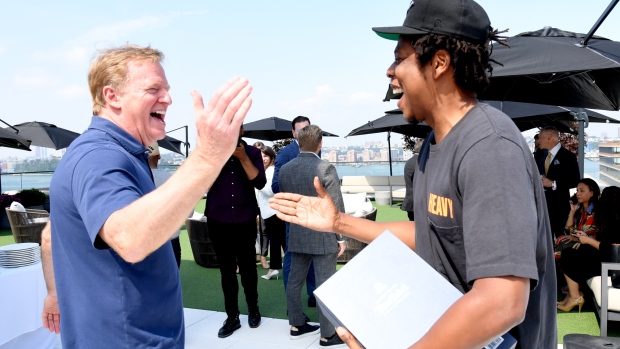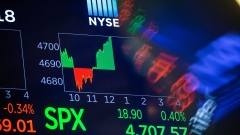Aug 17, 2019
Jay-Z Has Every Right to Take the NFL’s Money
, Bloomberg News

(Bloomberg Opinion) -- Maybe profit is evil?
That’s the only explanation I can think of for the vituperation being directed at the entertainment mogul Jay-Z for joining forces with the National Football League to make a buck. According to the NFL’s official announcement this week, the league and Roc Nation, Jay-Z’s umbrella company, are “entering into a multiyear partnership” that will “enhance the NFL’s live game experiences” and “amplify the league’s social justice efforts.”
Jay-Z (whose real name is Shawn Carter) is in business to make money, and is really good at it. The NFL is in business to make money, and is really good at it. The reason the deal exists is the same reason that most deals major exist: two for-profit entities see a way to make more profit.
Nevertheless, the anathemas have rained down.
“This is not a partnership I’m quite ready to embrace,” wrote Nana Efua Mumford in a Washington Post column. Her concern, shared by other critics, is that the deal is in effect a fig leaf, covering for the league’s treatment of controversial quarterback Colin Kaepernick, and for its failure to deal with the issues raised by his protest. Here’s Jeremy Stahl writing in Slate: “Kaepernick, through his protest movement and subsequent social justice work, has inspired plenty of change. It’s the NFL, now with Jay-Z’s help, that’s been all too eager to steal that narrative away.” Jemele Hill at The Atlantic puts the case even more precisely: “Why would Jay-Z waste any of his enormous social and cultural capital on the NFL when he doesn’t need the league’s platform, money, resources, or validation?”
The answer is that Jay-Z doesn’t consider the investment a waste. He’s in business to make a profit. He takes on partnerships that will make Roc Nation more profitable. The issue isn’t whether he “needs” the NFL, but whether partnering with it will be good for his company. Plainly, he’s decided the answer is yes.
The theory that he should have made a different decision says, in effect, that because of the NFL’s treatment of Kaepernick, Jay-Z shouldn’t take the league’s money. I agree that the league’s actions have been scandalous. And given that collusion cases are extremely difficult to prove, I’m glad Kaepernick got paid. (Yes, he got less than he was seeking, but that’s what makes a settlement a settlement.)
Yet it is exactly here that we arrive at the problem with the critics’ argument: If Jay-Z shouldn’t take the NFL’s money, why should the players? Surely by accepting annual salaries that in some cases are in the eight-figure range, they’re betraying the same principles.
The usual answer is that football players generally have no other skills that would pay them as much. In other words, they have made a human capital investment that is asset-specific. Their skills are marketable not only in a single industry but (if we consider the NFL as a whole) to a single employer. The league thus possesses a degree of monopsony power over the players.
But the league’s bargaining power is tempered both by the ability of the players to bargain collectively and by the need to keep salaries in a range that will keep talented athletes from choosing other sports. The median salary of an NFL player in 2018 was about $860,000. In 2017, the average (not median) income for the top 1 percent of earners in the U.S. was about $719,000. No surprise here: Compared to most people, NFL players are paid quite well. And, like most people, they prefer to invest their labor where they will receive the highest return.
Note that Jay-Z is in the same business: maximizing his wealth. The only difference is that the players are a little bit rich whereas Jay-Z is extremely rich. And it’s true that his abilities aren’t specific to professional football. Still, if the argument is that it’s morally wrong for him to deal with the NFL, it’s hard to see why relatively well-compensated players should be exempt.
To be sure, there are those who have attacked the deal on other grounds. For example, because Roc Nation represents several NFL players, the deal might possibly involve a conflict of interest. Certainly a star player in search of an agent is likely to give serious consideration to signing with the company, given its cozy relationship with the league.
Still, the principal complaint remains that the entertainer is taking tainted money from an entity desperate to fix its reputation. Jay-Z himself argues that he can fight more effectively for social justice from within. Maybe so. But whether he’s right or wrong in that particular judgment, the larger point is that the money isn’t tainted. At bottom, Jay-Z is a capitalist trying to make a buck. And unless you think the NFL’s behavior is so reprehensible that all the players should quit, it’s hard to see why Roc Nation shouldn’t take the league’s money.
To contact the author of this story: Stephen L. Carter at scarter01@bloomberg.net
To contact the editor responsible for this story: Sarah Green Carmichael at sgreencarmic@bloomberg.net
This column does not necessarily reflect the opinion of the editorial board or Bloomberg LP and its owners.
Stephen L. Carter is a Bloomberg Opinion columnist. He is a professor of law at Yale University and was a clerk to U.S. Supreme Court Justice Thurgood Marshall. His novels include “The Emperor of Ocean Park,” and his latest nonfiction book is “Invisible: The Forgotten Story of the Black Woman Lawyer Who Took Down America's Most Powerful Mobster.”
©2019 Bloomberg L.P.





















